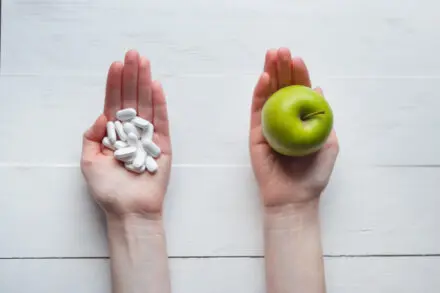Are food supplements dangerous?
One of the most recurring questions about food supplements is whether they are dangerous, and everyone has their own opinion. The objective and scientifically measurable data, those on which we should focus, are mixed and confused in the midst of opinions, factions, opinions of experts and non-experts in the sector, marketing claims, self-proclaimed food gurus and influencers.
But let’s try to answer the question by taking a step back and first let’s ask ourselves:
WHAT ARE SUPPLEMENTS?
Technically, food supplements contain the same molecules as food, so, to some extent, they are food. It may seem strange, given that their formats (tablets, caps, powders) remember us drugs we buy at the pharmacy.
However, food supplements are completely different from drugs.
Indeed, the latter are artificial molecules, while food supplements contain the nutrients which are naturally present in food, in selected and/or concentrated form.
Nutrients are natural molecules that our body has been using for thousands and thousands of years.
The body uses these nutrients because it recognizes their chemical structure. For example, vitamin C (ascorbic acid), whether it comes from food (for example an orange) or from a food supplement, is then used by our body in the same way.
BUT CAN SUPPLEMENTS BE HARMFUL TO OUR BODY?
There are those thinking that taking food supplements causes hypervitaminosis or kidney damage, but these are unjustified beliefs in healthy people who respect the directions for use.
It is much more likely to have health issues with a diet too high in saturated fat, sugar and salt.
Indeed, the fast-paced Western lifestyle and the prevalence of refined food, increase the occurrence of imbalances in the diet. For example, many of us are deficient in one or more vitamins (do we eat fruit and vegetables with every meal?), omega 3 fatty acids (who eats fish at least 2-3 times a week?), And we often do not reach the recommended daily protein intake.
Food supplementation has the role of filling these gaps or micro-deficiencies.
In addition, the European Food Safety Authority (EFSA) attentively establishes the maximum quantities of a given nutrient that can be added into a food supplement. These limits are established in a prudential and precautionary manner, that is why the recommended dose of the given supplement is always far from the quantity that can potentially compromise health.
Obviously, it is very important to follow the recommended dosage.
“Too much” is always wrong, both in case of food supplements and in case of food.
Indeed, even the water itself, which is the most important nutrient of all, if taken in excess (about 5 liters in a few hours) can be toxic (!), as it over-dilutes the body (“water poisoning”).

